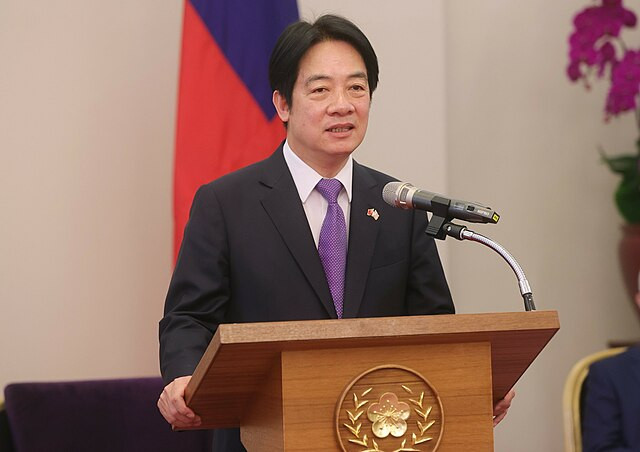Taiwanese President Lai Ching-te said Friday his administration would step up communication with the United States and increase investments following former President Donald Trump's push for reciprocal tariffs on trade partners. The move comes as Trump, the presumptive Republican nominee for the 2024 election, has signaled an intent to restore semiconductor manufacturing within the U.S., citing Taiwan's dominance in the industry.
"Taiwan's government will communicate and discuss with the semiconductor industry and come up with good strategies," Lai said after a National Security Council meeting in Taipei. "Then we will come up with good proposals and engage in further discussions with the United States."
Trump, speaking Thursday, accused Taiwan of taking away the U.S. chip industry and reiterated his intention to bring semiconductor production back to the country. Taiwan is home to TSMC, the world's largest contract chipmaker and a critical supplier to major American firms, including Apple, Intel, and Nvidia.
Lai framed Taiwan's semiconductor sector as part of a global ecosystem, emphasizing its integral role in the supply chain. "The global semiconductor industry is an ecosystem, and it's a division of work," he said, adding that Taiwan seeks a "win-win scenario" to benefit both economies.
Taiwan has emerged as a crucial player in the U.S. tech supply chain, particularly as Washington seeks to reduce reliance on Chinese manufacturing. Over the past two years, more than 40% of Taiwan's overseas investments have flowed to the U.S., exceeding its investments in China, according to Lai.
The Taiwanese leader announced plans for a "global semiconductor democratic supply chain partnership initiative" to strengthen industry cooperation with like-minded countries. He also committed to working with the U.S. to bolster a resilient and diversified semiconductor network.
Lai said his government would support TSMC should the chipmaker decide to expand its investments in the U.S. The company is already investing $65 billion in two chip fabrication plants in Arizona, a project initiated during Trump's first administration.
The semiconductor giant's shares closed down 2.8% in Taipei on Friday, underperforming the broader market, which fell 1.1%. TSMC did not immediately respond to requests for comment.
A senior Taiwanese security official, speaking on condition of anonymity, said Taiwan's government would facilitate talks with the U.S. if TSMC deemed it feasible to increase its American investments. "Communications between Taiwan and U.S. economic, security, and defense officials at present are quite good," the official said. "Strong support from the United States can be felt."
The U.S., which does not formally recognize Taiwan as a sovereign nation, remains the island's most significant backer and primary arms supplier. Trump recently praised Taiwan after a joint U.S.-Japan statement reaffirmed support for "maintaining peace and stability across the Taiwan Strait" and called for Taiwan's "meaningful participation in international organizations."
However, Taiwan's growing trade surplus with the U.S.-which surged 83% last year to a record $111.4 billion, largely due to semiconductor exports-has placed it in the crosshairs of Trump's trade policies. The former president has repeatedly criticized nations with trade imbalances and could push for additional tariffs on Taiwanese imports if re-elected.
Lai also announced plans to propose a special budget to increase Taiwan's defense spending from 2.5% to over 3% of GDP. Trump has previously called on Taiwan, along with other U.S. allies, to contribute more to their own defense.
"Taiwan must demonstrate our determination to defend ourselves," Lai said, acknowledging concerns from international partners. His administration remains locked in a political battle with opposition parties in parliament over budgetary allocations, including defense spending.
"Certainly, more and more friends and allies have expressed concern to us, worried whether Taiwan's determination for its self-defense has weakened," Lai said.






